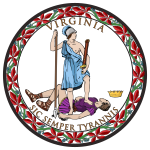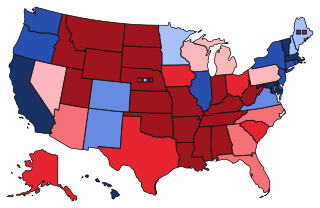
Political party strength in U.S. states is the level of representation of the various political parties in the United States in each statewide elective office providing legislators to the state and to the U.S. Congress and electing the executives at the state and national level.

The 1920 United States House of Representatives elections were elections for the United States House of Representatives to elect members to serve in the 67th United States Congress. They were held for the most part on November 2, 1920, while Maine held its on September 13. They coincided with the election of President Warren G. Harding, the first time that women in all states were allowed to vote in federal elections after the passage of the 19th Amendment.

The 1874–75 United States House of Representatives elections were held on various dates in various states between June 1, 1874, and September 7, 1875. Each state set its own date for its elections to the House of Representatives before the first session of the 44th United States Congress convened on December 6, 1875. Elections were held for all 292 seats, representing 37 states.
The Independent Greens of Virginia was the state affiliate of the Independence Party of America in the Commonwealth of Virginia. It became a state party around 2003 when a faction of the Arlington local chapter of the Green Party of Virginia (GPVA) split from the main party. As of 2011, it bills itself as a "fiscally conservative, socially responsible green party", with an emphasis on rail transportation and "more candidates". In support of wider ballot participation, it endorses many independent candidates who are not affiliated with the party.

The 2004 United States presidential election in Virginia took place on November 2, 2004, and was part of the 2004 United States presidential election. Voters chose 13 representatives, or electors to the Electoral College, who voted for president and vice president.

The politics of Virginia have followed major historical events and demographic changes in the commonwealth. In the 21st century, the northern region has become more liberal in attitudes and voting, constituting a reliable voting bloc for Democrats and joining with population centers in the Richmond Metropolitan and Hampton Roads areas to dominate the state. Political orientation varies by region, with the larger cities and suburban areas generally voting Democratic and the rural areas voting Republican. The southern, rural regions have remained Republican. Until 2021 when the GOP swept all statewide offices, Virginia was shifting more Democratic and now is considered a swing state again by most pundits.

The 2008 United States presidential election in Virginia took place on November 4, 2008, which was part of the 2008 United States presidential election. Voters chose 13 representatives, or electors to the Electoral College, who voted for president and vice president.

The 2010 congressional elections in Virginia were held November 2, 2010, to determine who will represent the state of Virginia in the United States House of Representatives. Representatives are elected for two-year terms; those elected served in the 112th Congress from January 2011 until January 2013.

The 2000 United States presidential election in Virginia took place on November 7, 2000, and was part of the 2000 United States presidential election. Voters chose 13 representatives, or electors to the Electoral College, who voted for president and vice president.

2009 Elections to the Virginia House of Delegates were held on November 3, 2009. Prior to the election, Republicans held 53 seats, Democrats held 43 seats, and Independents held 2 seats.

Elections in Virginia are authorized under Article I of the Virginia State Constitution, sections 5–6, and Article V which establishes elections for the state-level officers, cabinet, and legislature. Article VII section 4 establishes the election of county-level officers. Elections are regulated under state statute 24.2-102. The Virginia State Board of Elections oversees the execution of elections under state law. In a 2020 study, Virginia was ranked as the 12th easiest state for citizens to vote in.

The 2011 Virginia state elections took place on November 8, 2011. All 140 seats in the Virginia General Assembly were up for re-election, as were many local offices.
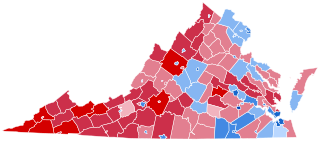
The 2012 United States presidential election in Virginia took place on November 6, 2012, as part of the presidential election in which all 50 states plus the District of Columbia participated. Virginia voters chose 13 electors to represent them in the Electoral College via a popular vote pitting incumbent Democratic President Barack Obama and his running mate, Vice President Joe Biden, against Republican challenger and former Massachusetts Governor Mitt Romney and his running mate, Congressman Paul Ryan.

Virginia's 1999 state elections were held on November 2, 1999. Voters elected all 100 members of the Virginia House of Delegates to two-year terms ending in 2002, and all 40 members of the Virginia Senate to four-year terms ending in 2004. There were also elections for local offices in most counties. The elections resulted in the loss of Democratic control of the House of Delegates for the first time in 116 years, and continued the two-year control of the Senate by Republicans.

The 2016 United States presidential election in Virginia was held on November 8, 2016, as part of the 2016 general election in which all 50 states plus the District of Columbia participated. Virginia voters chose electors to represent them in the Electoral College via a popular vote pitting the Republican nominee, businessman Donald Trump, and running mate Indiana Governor Mike Pence against Democratic nominee, former Secretary of State Hillary Clinton and her running mate, Virginia Senator Tim Kaine.

The Virginia House of Delegates election of 2003 was held on Tuesday, November 4.
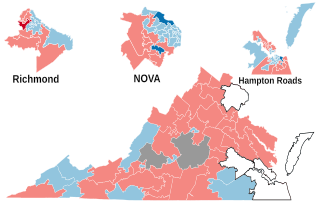
The Virginia House of Delegates election of 2007 was held on Tuesday, November 6.

The 2020 United States presidential election in Virginia was held on Tuesday, November 3, 2020, as part of the 2020 United States presidential election in which all 50 states plus the District of Columbia participated. Virginia voters chose electors to represent them in the Electoral College via a popular vote, pitting the Republican Party's nominee, incumbent President Donald Trump, and running mate Vice President Mike Pence against Democratic Party nominee, former Vice President Joe Biden, and his running mate California Senator Kamala Harris. Virginia has 13 electoral votes in the Electoral College.

Virginia state elections in 2020 was held on Tuesday, November 3, 2020. With the exception of its Democratic Party presidential primary election held on March 3, 2020, its primary elections were held on June 23 of that year.
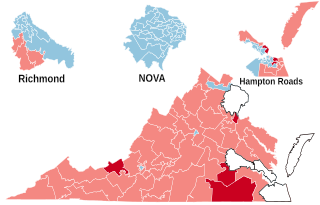
The 2021 Virginia House of Delegates election for the 162nd Virginia General Assembly were held on November 2, 2021, to coincide with biennial elections in the U.S. state of Virginia. All 100 Delegates are elected to two-year terms in single-member constituencies. Primary elections took place on June 8. This election coincided with the 2021 Virginia Gubernatorial election, the Lieutenant Gubernatorial election, and lastly, the Attorney General election, all of which were won by Republicans. The upper house of the Virginia General Assembly, the Senate of Virginia, held its next elections on November 7, 2023.

